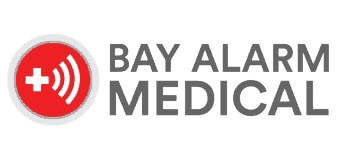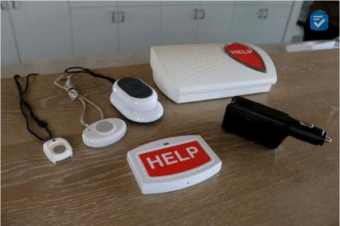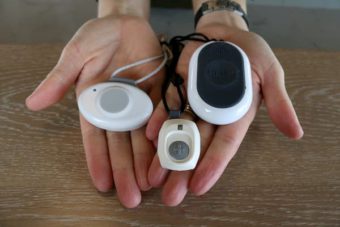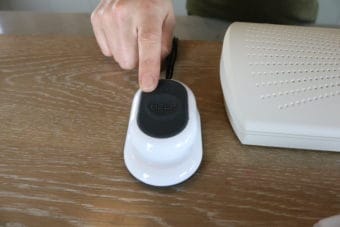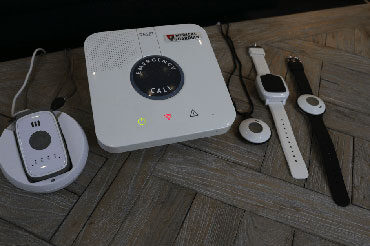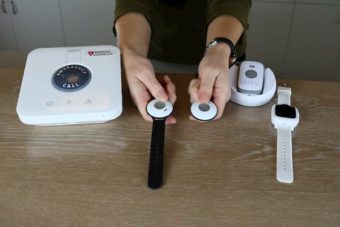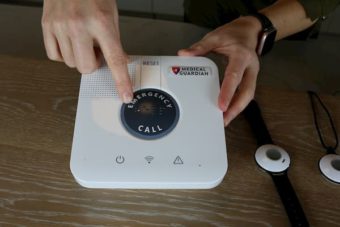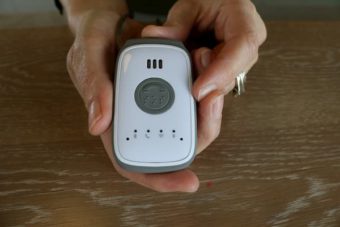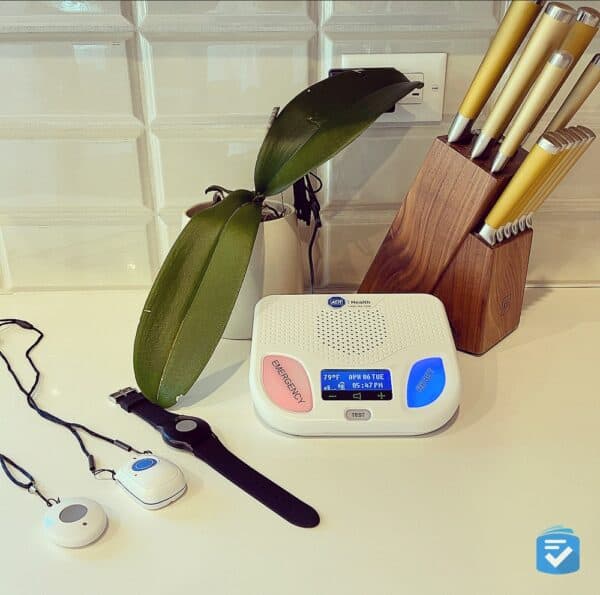Best In-Home Medical Alert Systems of 2024
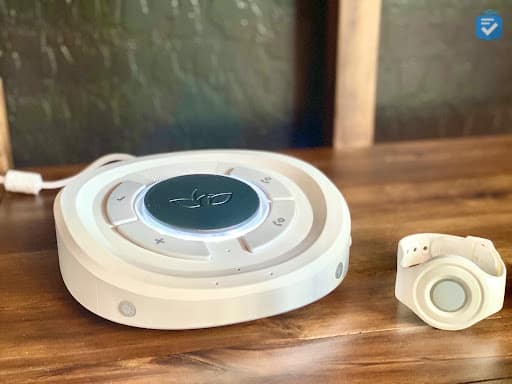
The Senior List is compensated when you click on the provider links listed on this page. This compensation does not impact our ratings or reviews. Click here to learn more about our editorial review process and click here to learn more about how we are compensated.
Overall Rating:
855-675-0754
Overall Rating:
877-947-4512
The Best In-Home Medical Alert Systems
- Bay Alarm Medical : Affordable In-Home Options
- Medical Guardian : Best for Spouse Coverage
- ADT : Easiest to Use
- Lively : Best for In-Home and On the Go
- Aloe Care Health : Best Caregiver Features
For older adults, a good medical alert system is a sensible idea. In fact, I’d go as far as to say it’s a must for any older adult who wants to remain in their home. Getting help quickly is vital in the event of a fall or medical emergency. Even seniors who live with a spouse or relative have no guarantee that person will be around should something happen.
A medical alert button ensures that, should a senior need help, someone is there for them, 24 hours a day. With one press of the button, they’re in touch with the call center, who can dispatch an ambulance, a family member, or a caregiver, as needed.
If you or your loved one is hoping to age in place, an in-home medical alert system can be an essential part in preparing your home for the endeavor. Those who are mostly at home frequently stay there due to medical issues, or sometimes because they’re recovering from a hospital stay. It only makes sense to make sure they have that extra backup should they need it.
After ample testing, I’ve come up with a list of my three favorite medical alert systems for in-home use.
How We Chose the Best In-Home Medical Alert Systems
| Companies Evaluated | 24 |
| Hours of Research | 100+ |
| Hours of Product Testing | 1,000+ |
| Ranking Criteria | 5 |
| Finalists Chosen | 5 |
When choosing the best in-home medical alerts, there were a few things we looked for to evaluate the many different systems available. Here’s how we rated each medical alert company:
- Quick response times: At the end of the day, a medical alert system is a communicative device, linking those in need with trained response agents. Because of this, I look for companies that will answer distress calls in under 20 seconds.
- Durable equipment: A medical alert system should be with you for the long haul, so we tested devices to make sure they could withstand occasional falls or drops. Bonus points went to systems with waterproof buttons, as the bathroom is one of the most common sites of falls.
- Accurate fall detection: Now a standard add-on feature of medical alert systems, fall detection is particularly useful for those with mobility or dexterity issues. That said, many fall detection buttons trigger false alarms, so we looked for only the most accurate fall- detection mechanisms.
- Caregiver features: A quality in-home system can keep a person safe around the house, but I also appreciate when medical alerts include companion apps or caregiver portals. This allows people to keep better track of their loved one’s overall wellness.
- Straightforward pricing: Unless you’re being offered a substantial discount, you should never lock into a long-term contract for a medical alert system. Because of this, every system included on this list offers month-to-month pricing and free trial periods.
New to the world of medical alerts? Take a look at my guide to medical alert systems to learn more.
1. Bay Alarm Medical - Affordable In-Home Options
What We Like Most:
- 30-day risk-free trial
- Optional fall detection
- Location tracking on mobile units
- Systems starting at $24.95 per month
Overview
Bay Alarm Medical is a well-known medical alert company that provides innovative medical alert solutions (such as an in-car option), backed by caring customer service. In terms of in-home systems, Bay Alarm offers both landline and cellular options, the latter costing an additional $5 per month. Their help button can be worn as either a pendant or wristband, both of which can be worn in the shower.
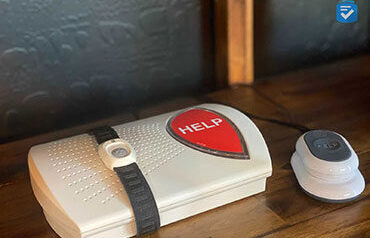
Bay Alarm Medical In-Home Systems
Starting at only $24.95 per month, Bay Alarm Medical has one of the most affordable medical alert systems available. In terms of add-ons, you can also add a lockbox, spare buttons, a vial of life (free on most plans), or a protection plan. You can also add monitoring for a spouse for $3 monthly. Fall detection will run you an additional $10 per month, and it’s well worth the price.
My other favorite accessory from Bay Alarm Medical is their voice-activated help buttons. These devices, when mounted on your wall, can serve to augment the 1,000-foot range of your in-home system. To activate them, you simply have to call for help, and the system will trigger a call to the monitoring center. Additionally, you can purchase an additional help button (perfect for a spouse or roommate) for a one-time fee of $35.
Pros
- One-time $35 fee for additional help buttons
- $15 per month for additional fall buttons
- 1,000-foot in-home range
- Two U.S.-based monitoring centers
- 32-hour in-home backup battery
- Water-resistant devices
Cons
- Equipment fees for some systems
- Extra cost for fall detection
With so many add-ons (most of which require additional monthly fees), the pricing for Bay Alarm Medical can get a bit confusing. However, the quality of their equipment and customer service is second to none, making them one of the best in-home medical alert systems available.
To learn more about Bay Alarm Medical, check out my full review of Bay Alarm’s systems.
2. Medical Guardian - Best for Spouse Coverage
What We Like Most:
- No long-term contracts
- Quick response times
- Fall detection available
- 24/7 U.S. based monitoring
Overview
Medical Guardian has been around for over 10 years and is a fast-growing medical alert company. I’m always impressed with their range of systems, high-quality equipment, and quick response times.
Medical Guardian In-Home Systems
In terms of in-home systems, they offer both landline and cellular-based options, the former of which is slightly cheaper. They also offer extra wall buttons to put around the house for added protection, including voice-activated wall buttons.. You can also add fall detection for either in-home system for an additional $10 per month.
MGClassic, their landline system, starts at $29.95 monthly, while Home Guardian, with its cellular connection, starts at $34.95 monthly, making Medical Guardian about average in terms of pricing. Sweetening the deal, Medical Guardian does not require users to lock into long-term contracts, unlike Life Alert.
Pros
- All-in-one mobile system
- Landline and cellular options
- Smartwatch option
- Accurate location tracking
- Fall detection available on most systems
- No long-term contracts
- Free month of service on annual subscriptions
- Up to seven-day mobile battery life
Cons
- Occasional false alarms with fall detection
- Limited activity monitoring
While Medical Guardian doesn’t offer as many advanced features as some other companies, they have some of the most durable systems, and their monitoring agents were consistently responsive and kind in each of our test calls. Medical Guardian is a reliable at-home system that makes it easier for caregivers to monitor their loved ones if necessary and offers protection in any part of the home.
To learn more about Medical Guardian, check out my full review of Medical Guardian.
3. ADT - Easiest to Use
What We Like Most:
- Waterproof help buttons
- Optional fall detection
- Quick response times
- Straightforward pricing
Overview
Many are familiar with ADT’s popular line of home security systems, but the same company also makes a line of reliable medical alert systems. ADT Health offers a range of medical alert systems that are both easy to use and highly durable.
ADT’s In-Home Systems
ADT’s Medical Alert Basic offers a great landline-based way to keep people safe in their homes. Costing $27.99 per month, this system includes one base unit and one help button, worn as either a pendant or wristband. Not only will this system monitor your home’s temperature, which will alert emergency personnel in the event of irregularities, its buttons are also fully waterproof. This makes it a great way to stay safe in the shower or tub.
Pros
- Waterproof help buttons
- No long-term contracts
- Automatic fall detection
- Personalized response plans
- Quick response times
- Landline options available
Cons
- Relatively small in-home range
- No smart features
- No caregiver tracking
ADT’s Medical Alert Plus costs $37.99 per month, and it operates on a cellular connection, meaning there’s no landline required. In addition to offering the same functionality as the Basic package, ADT’s Medical Alert Plus can also be paired with fall detection for an additional $10 per month. Similar to the help buttons, the fall detection pendant is also fully waterproof.
To learn more about my experience with ADT’s systems, check out my full review of ADT’s medical alerts.
4. Lively - Best for In-Home and On the Go
What We Like Most:
- No Long-Term Contracts
- Phones Designed for Seniors
- Medical Alert Features
- Flip Phones and Smart Phones Available
Overview
Known for their popular line of senior-friendly phones, Lively also offers a stand-alone medical alert device, the Lively Mobile Plus. Although this device is marketed for on the go use, I think it is also ideal for use in the home. Due to its cellular connection, the Lively Plus works anywhere, and it can be worn in multiple ways. It’s got a lovely modern look, too, proving that seniors at home don’t have to settle for old-fashioned-looking systems.
Lively’s In-Home Systems
Unlike the other systems on this list, Lively Mobile Plus doesn’t have a base station; rather, the device itself includes a help button and two-way speakerphone. This is what allows you to wear it both in and out of the house. Just be sure to charge it every day, as the battery only lasted about 22 hours in our testing.
Rather than add-on features, Lively offers set packages for the Lively Mobile Plus. The Basic package offers just the device and monitoring. However, customers can also opt for a Preferred or Ultimate package. Preferred includes UrgentCare, which connects the wearer to a live nurse or doctor chat any time, and an online caregiver tracking portal. Ultimate includes all of the above — plus a free replacement if the device is damaged, lost, or stolen — as well as added fall detection.
Pros
- No long-term contracts
- Low-priced phones
- Medical alert features
- Customizable talk, text, and data allowances
- Plans starting at $14.99 per month
Cons
- Only two phone options
- Potential overage charges
Basic costs $24.99 monthly, while Preferred and Ultimate plans cost $29.99 and $39.99, respectively. As with Lively cellular service, there are no long-term contracts required with this device. The only downside is that fall detection is not available as a stand-alone option. Instead, you’ll have to subscribe to the Ultimate package. Still, the Lively Mobile Plus is an easy-to-use and modern device that provides extra peace of mind for seniors and caregivers alike.
To learn more about Lively’s medical alerts, take a look at my full review of Lively Mobile Plus.
5. Aloe Care Health - Best Caregiver Features

What We Like Most:
- Voice Commands
- Useful Caregiver App
- Check-In System
- Optional Fall Detection
Overview
A newcomer in the world of home care, Aloe Care Health offers innovative medical alert systems with advanced caregiver tracking and even voice commands. For those with smartphones, a system from Aloe Care health even allows for non-emergency calls to loved ones, making them a great tool for overall communication.
Aloe Care Health’s In-Home Systems
Aloe Care Health offers three different in-home systems. The Essentials package, which costs a one-time $149.99 and a monthly $29.99 fee, features a smart base unit and wristband help button. The more advanced Total Care package, which costs a one-time $299.99 and monthly $49.99 fee, features everything in the Essentials package, plus two motion sensors, a mobile medical alert, and a wall-mounted fall detection system – perfect for use in the bathroom.
What I love most about Aloe Care Health, however, is the companion app. When a caregiver downloads this app, they can use their smartphone to stay abreast of any emergency calls, their loved one’s location, and even make direct calls to the base station. What’s more, every Aloe Care system features the ability to make calls (both emergency and non-emergency) through voice commands.
Pros
- Voice-activated calls
- Non-emergency call capabilities
- Activity, temperature, and air quality monitoring
- No long-term contracts
- Affordable mobile system
- Detailed app for caregivers
- Fall detection at no extra cost
Cons
- Higher start-up costs
- No spouse monitoring
While Aloe Care systems come with relatively steep start-up costs, their products offer a truly unparalleled connection between users and their caregivers. To learn more about my experience with their systems, check out my full review of Aloe Care Health.
Why Purchase an In-Home Medical Alert System?
Older adults are at a higher risk of falling than the rest of the population, and it’s so easy for falls to happen at home. The bathroom, kitchen, and laundry room are particularly dangerous places for slips and falls, as they tend to have slick surfaces that are often wet. There are also risks associated with steps and rugs or badly positioned furniture. Having an in-home medical alert means that, even if a fall happens, help can be on the way in seconds.
Seniors who are mostly at home need a reliable medical alert system they can trust. This gives caregivers extra peace of mind, too. They can rest assured that even when they’re not around, their loved ones are protected.
Getting help quickly in the event of a fall or other medical incident makes a big difference. A medical alert means that caregivers or EMTs are on the scene fast, and seniors are not stuck, unable to get help. Getting up or getting to the hospital faster has a positive effect on recovery times.
What to Look for When Choosing an In-Home Medical Alert
With so many medical alerts on the market, it can be hard to know which one to choose. Here are some must-haves to consider when selecting in-home medical alerts:
- Straightforward pricing: No one likes hidden surprises, so when speaking to a medical alert sales representative, be sure that the pricing and terms are clear and free of any hidden fees.
- Comfortable help buttons: The only way to stay protected is to keep your button on at all times, so a comfortable one is a must. People I care for generally prefer silicone wristbands, as these are form-fitting and free of odors.
- Fall detection: For seniors who are at home, fall detection is an important add-on; it helps ensure that if they can’t press their button, help can still come.
- Water-resistant devices: The bathroom is one place where seniors need extra protection in case a fall happens. As such, I prefer water-resistant help buttons so that you can still remain protected while bathing.
- Backup battery: Since in-home medical alert systems are powered through wall outlets, your system should have a backup battery of at least 24 hours, ensuring that your loved one can remain protected in the event of a power outage.

